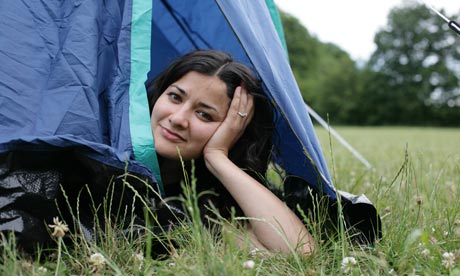
“Do I look like a camper to you?” splutters my friend Kiren. And I have to admit, her blow-dried hair and impeccable nails don’t scream “tent-lover”. What about Anna who grew up in Macclesfield, a stone’s throw from the Peak District? “Why would I?” she demands, puzzled. Amal, meanwhile, has never even considered slumming it in a tent.
Camping may have thrown off its Peruvian socks image and become as fashionable as vintage clothes and cupcakes, but not everyone is enchanted. The few times I have been to a campsite, I’ve always been one of the only non-white faces around. And while my white friends will camp anywhere – campsites, festivals, literary events – my non-white friends are not convinced.
Matthew Eastlake, marketing director of the Camping and Caravanning Club, agrees that ethnic minorities are “not hugely represented” in the club, despite a membership of nearly half a million. This tallies with evidence that few ethnic minority families go to the countryside for holidays – for instance, only 1% of visitors to our national parks are from a minority background, compared to 10% of the population.
Shalini, a lawyer who loves camping, admits she has been only with white friends. “You do stick out more on a campsite,” she says. “I brace myself for comments like ‘That’s a funny name’ or ‘Where do you come from?’. I think that would be uncomfortable for families or groups of young people.”
Then there’s the fact that Asian family holidays tend to be sprawling, all-encompassing affairs. I remember the intakes of breath and faces squashed against the window as we tried to jam four adults and six kids in each car on family days out. While this might seem to fit with camping, Shalini reckons it makes ethnic minorities more careful about where they go. “Asian families tend to go on holiday with a whole load of people and a whole load of stuff; so they can be worried about putting people’s noses out of joint.”
For Amal, who grew up in Somalia, it’s the fear of the countryside. “I feel London is my comfort zone,” she tells me. Like many people, she is nervous about what Trevor Phillips once called the “passive apartheid” of the countryside – the fact that rural areas have such a low ethnic-minority population. “I worry that people will be mean or unfriendly with me,” Amal says. “Basically, I’m worried they will be racist.”
Yet camping is experiencing a boom, which Eastlake attributes in part to the recession. “Now it’s not so cool to be extravagant and environmentally unfriendly. People are thinking more about family time and simple pleasures.”
One thing Asian families understand is family time – so what’s holding us back? For a start, there is no culture of camping among immigrant communities, which means no nostalgic pull. The countryside is seen as a place to escape from. Satirical website Stuff White People Like puts its succinctly: “If you find yourself trapped in the middle of the woods without electricity, running water or a car, you would likely describe that situation as a ‘nightmare’ . . . White people refer to it as ‘camping’.”
Kiren tells me her parents, originally from Pakistan, would never have taken her camping. “Culturally, you are considered poor if you live or stay somewhere without brick walls.”
Mustafa Audhali, who helps run a Muslim Scout group in Birmingham, says the connection between simple living and poverty is just too strong. “The majority of ethnic-minority groups have come over during the last few decades into a deprived way of life, working in difficult jobs such as in factories or mills, and have slowly built themselves up – so camping may be seen as a backwards step.”
When I ask Anna’s mum, who was brought up in Bangladesh, whether she would consider camping, she laughs. Yet I know her family comes from a beautiful village. “Yes,” sighs Anna. “So if they see a pretty river or green fields here, my family will say, ‘You think this is green? You should see Bangladesh.”
Things are changing, though. On my last camping trip I met a mixed-race couple, and Eastlake says numbers of ethnic minority campers are (slowly) increasing. Audhali says he has been inundated with requests from parents who want their children to enjoy sleeping outdoors in a way that they never did. “It’s definitely something I will do with my kids. My daughter is only one at the moment, but I can’t wait to take her. And when our scouts grow up, I hope they will take their own families.”
Even Amal is willing to be swayed. “I would consider it one day – but I would still prefer to have someone white camping with me.”

